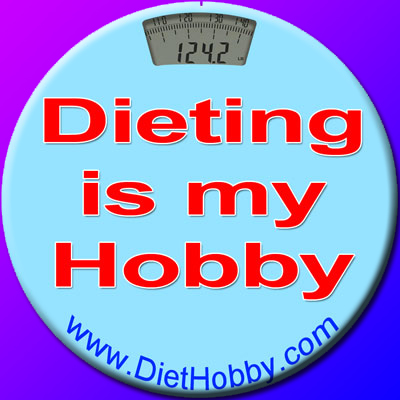
Diet Wisdom
Dr. Collins shares Dieting and Weight-Loss Information
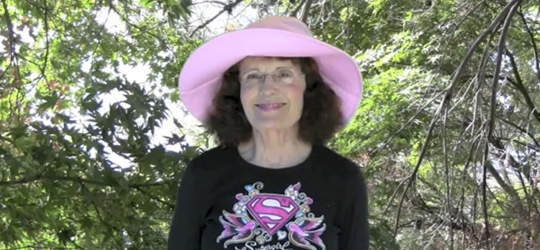
Words of Wisdom
Dr. Collins makes Brief Positive Statements for Inspiration and Motivation.
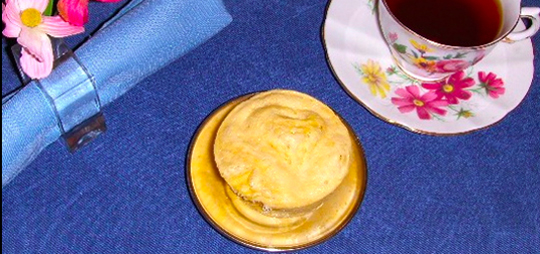
Recipes
Healthy Home Cooking by Dr. Collins for a Low-Calorie Lifestyle.
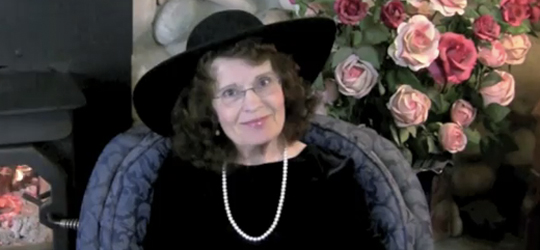
Grandma's House
A place for Grandbabies to visit with their online Grandma.
What to Eat?
- POSTED ON: Sep 02, 2015
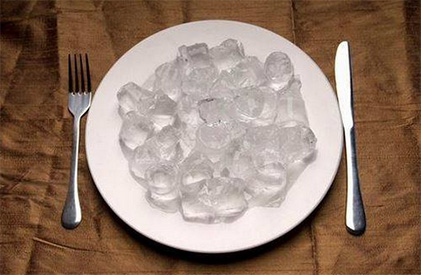
Yumm !!!
![]()
Here's a vegan, gluten-free, soy-free, antibiotics-free, raw, non-GMO, organic, fat-free, low-carb, low-calorie meal.
Preparation Note:
Use Filtered water only.
The Diet Fix, Why Diets Fail, How to Make Yours Work - Book Review
- POSTED ON: Aug 30, 2015
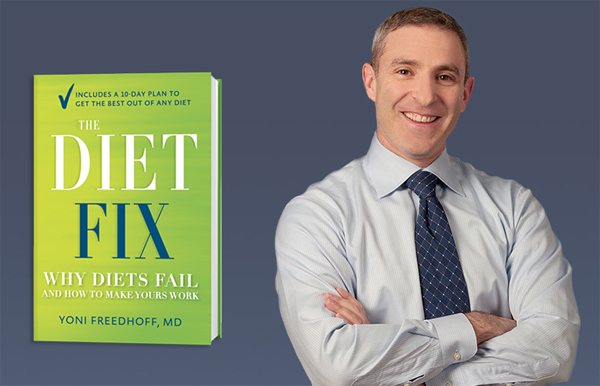
![]() The Diet Fix, Why Diets Fail, And How To Make Yours Work (2014) by Dr. Yoni Freedhoff, M.D. promotes a sane, compassionate approach to getting a grip on food and weight. He points out that 90% of all diets end in failure and addresses how to fix the way we lose weight to make results last.
The Diet Fix, Why Diets Fail, And How To Make Yours Work (2014) by Dr. Yoni Freedhoff, M.D. promotes a sane, compassionate approach to getting a grip on food and weight. He points out that 90% of all diets end in failure and addresses how to fix the way we lose weight to make results last.
Dr. Freedhoff, says, "at the end of the day if you don't like the life you're living while you're losing weight, you're virtually certain to gain it back." This book doesn't push or demonize any food group and provides a step-by-step process for a frustrated person trying to lose weight and keep it off in a healthy manner.
I've chosen The Diet Fix as the next book for discussion here in DietHobby's BOOKTALK. If you are interested in discussing the book or seeing videos about it be sure to check out that section.
This diet book doesn’t recommend any particular diet. It has no strict meal plan with foods that are either celebrated or demonized. There are no traumatic sacrifices required. No starvation, no cleanses, and no miracle supplements.
The Diet Fix contains no outlandish promises, no strict dietary rules, no excessive exercise, and no recommendations for supplements and potions. The book is a excellent science-based guide for anyone looking for credible advice on permanently sustainable weight loss.
Dr. Freedhoff starts out by listing “Dieting’s Seven Deadly Sins” which is the label he attaches to commonly held beliefs about dieting. These are:
- Hunger . "If I'm not hungry, my diet's not working." Dr. Freedhoff argues that any diet plan that leaves you hungry won’t be sustainable.
- Sacrifice. "No, no birthday cake for me, thanks". Dr. Freedhoff says that perpetual sacrifice of things that you enjoy will make any diet fail.
- Willpower. "If I close my eyes and run past the cupboard, I can make it to the bedroom without hitting the chips." Dr. Freedhoff says that willpower is important, but permanent resistance is almost certainly futile.
- Blind food restrictions. "
BMI Classifications and Emotional Eating
- POSTED ON: Aug 29, 2015
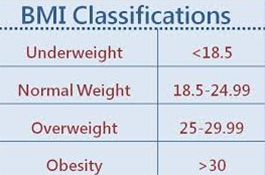
![]()
I've only paid attention to the BMI and its classifications during the past ten years or so ... after I began spending lots of time on the internet.
My BMI ignorance happened despite the fact that I've spent over 60 years of my life dieting, which has included - from the 1960's through the present date - reading hundreds and hundreds of diet books as soon as they were published.
I didn't need the BMI to tell me I was fat, because our culture gave me that information in thousands of other ways.
![]() It was only when I had lost a great deal of weight, and was setting my ultimate weight "goal" that BMI Classifications got my attention. I then learned that - for my BMI - a "normal" weight is between 95 and 127 pounds.
It was only when I had lost a great deal of weight, and was setting my ultimate weight "goal" that BMI Classifications got my attention. I then learned that - for my BMI - a "normal" weight is between 95 and 127 pounds.
Since I spent the majority of my life - at a height of 5' 0" - around and above 200 pounds - with a high of 271 pounds, for me to reach a weight of 129 was a fantastic success bordering on the incredible. Therefore, I was not happy to learn that at this 129 number I was still considered "overweight". ... and needed to lose more... and more... and that my goal should be to have a body with less and less substance. In fact, I've sometimes thought that what our culture (including the medical profession) really wants in general, is for me to get small enough, and light enough, to disappear entirely.
I may write more about this at some future time, but for now, I'll share the following article:
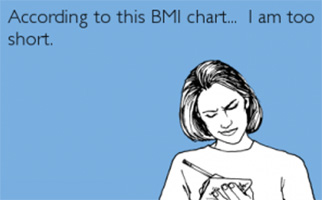 How BMI affects emotional eating
How BMI affects emotional eating
by Isabel Foxen Duke
of
How to Not Eat Cake
...really fast, standing up, when nobody's looking.
I recently made a passing comment to a colleague…something along the lines of “BMI is bullshit.”
In the slightly patronizing manner that only an older, male, health professional can assume, he said to me: “I would be careful to make blanket statements like that…you don’t know all of the different ways that BMI is used…”
Keep Your CONCERN to Yourself
- POSTED ON: Aug 27, 2015
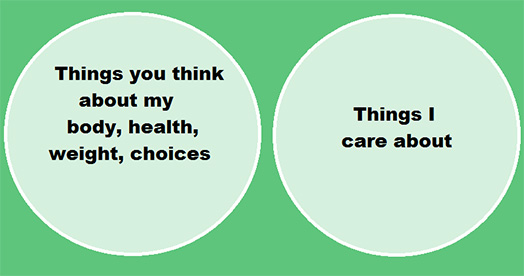

Voicing your
pseudo-concern about the bodies of others.
This is not a Tree.
I am not a Kitten.
Put Your
Ladder Away.
Keep Your Concern to Yourself
by Ragen Chastain of Dances With Fat
Reader Sara told me about some food-shaming dishes. Some of the plates are:
1. “It’s hard to be around you when you eat like this."
2. "Did you really need that second helping?."
3. "Please stop eating, we’re worried about you."
4. "For the love of God, stop eating.”
Let’s start with my answers in order:
1. "See ya."
2. "No, but at this point if I stop eating with this fork I’m going to stab you with it; so bring on a third helping, or get some gauze for compression."
3. "I can’t stop you from worrying, but I can stop you from talking to me about it."
4. "For the love of God, mind your own business."
We’ve already talked about the total bullshit that is the “Do you need to eat that” question. But of course it goes beyond that.
I’ve heard people suggest that it’s their moral obligation to tell fat people that we “need to lose weight”, exercise more, or that if someone sees a fat child they need to say something to the caregiver. I’ve been part of any number of conversations where people who had no business or permission to talk to me about my weight did so.
I asked some friends on Facebook who had spoken to them about their weight inappropriate. The answ...
If I had Millions of Dollars ....
- POSTED ON: Aug 25, 2015

![]()
See
Video
Below
...
<< Newest Blogs | Page 93 | Page 103 | Page 113 << Previous Page | Page 121 | Page 122 | Page 123 | Page 124 | Page 125 | Page 133 | Page 143 | Page 153 | Next Page >> Oldest >>







